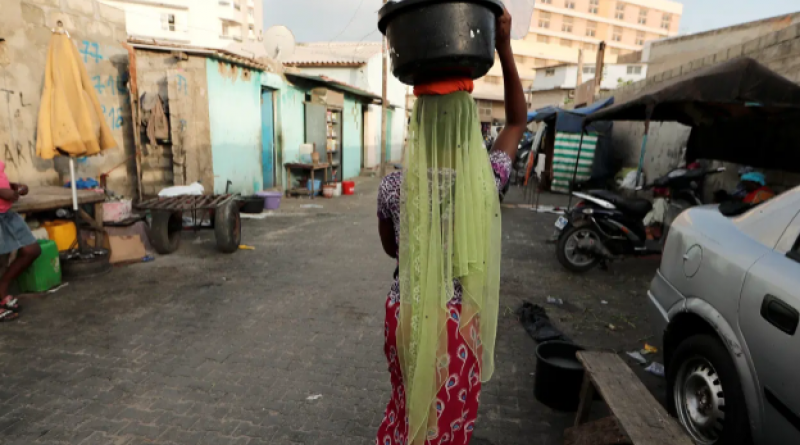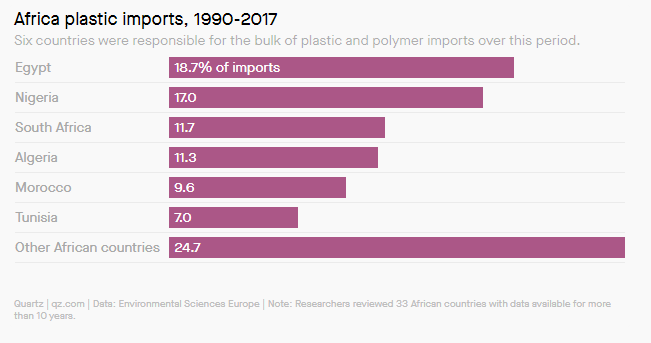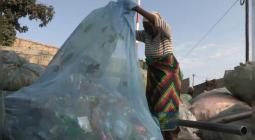Africa’s plastics bans are pitting the environment against the economy.

An insufficient supply of potable water in many countries, mostly in Sub-Saharan Africa, has given rise to a new plastics economy driven by the increasing popularity of water sachets.
More than 30 of Africa’s 54 countries have progressively adopted anti-plastic bag policies since 2000. But experts claim the effects remain insignificant, considering the persistent use of plastic products such as water sachets across much of Africa, and the disregard for the numerous threats they pose.
In many African countries, single-use plastics have become a part of people’s daily life. In the absence of alternatives, citizens are obliged to live in a plastic cycle—buying, using, dumping and buying again. Many seem to be oblivious of the environmental impact of the waste they generate on a daily basis. Some of those who are aware blame the authorities instead for the filthy situation.
Nigeria could be the highest consumer of water sachets on the continent due to its population size (206 million) and poor water facilities—most homes do not have running water. Local reports say the country generates 2.5 million tons of plastic waste each year.

“We live in a country where nobody cares about the environment. How do you eradicate plastic water bags when three out of five Nigerians consume them per day because there is no public water supply?” says Abdullahi Salifu, a Kano-based drinkable water activist.
Salifu says that in northern Nigeria, where he lives, “water taps have been dry in many cities and localities for more than seven years now. I think a complete ban won’t work without the availability of public water supply. What we need to do presently is to educate people on proper disposal of plastic material to protect the environment.”
A thriving plastics economy, built to meet the important needs of clean drinking water and employment, has come head-to-head with the urgent need to protect fragile environments on a continent that is rapidly urbanizing.
A problematic, profit-generating supply chain
Plastic bags are derived from polyethylene, a polymer primarily used for packaging. The source substances of polyethylene are mostly fossil fuels like petroleum and natural gas—another reason why the entire process draws the ire of environmental specialists.
The most common polyethylene in the region is the Type 2 plastic, used for manufacturing shopping bags and for packaging drinkable water sold in a 500ml sachet (colloquially referred to as pure water). This plastic is technically known as high-density polyethylene (HDPE) – a non-biodegradable material.
The supply chain for water sachets starts with distributors of LDPE plastic film rolls, who mostly import their products from China and India, and sell to those involved in packaging. They in turn supply wholesalers, who sell to retailers, who go on to sell at road junctions, traffic lights, marketplaces, and at event spots like stadiums, parties and marriage gatherings.
Nearly 63% of people in urban areas of sub-Saharan Africa find it hard to access basic water services. Water sachets have several advantages that have made them popular among low and middle-income earners. They are cheap, available everywhere, transportable, and fresh, since they are sold in coolers or in basins filled with ice cubes. Few families have a refrigerator in the region; those that do are often confronted by power irregularity or high bills.
But these water carrier bags have become a symbol of a serious waste problem in Africa, as most buyers dump the lightweight sachets on the ground after consumption, leaving them to be dispersed by water and wind.
“These abandoned single-use plastics drift into waterways, clog drain pipes, and cause erosion,” says Modeste Alima, co-founder of Course Verte Benin, a popular eco-sport NGO in the Benin Republic. “Some still store droplets of water which could gradually turn into mosquito nesting habitats, causing malaria, Africa’s number one killer disease.”
“Look at the streets and beaches of most cities in sub-Saharan Africa, especially; you see plastic bags littering everywhere,” Alima says. “It is not good for our tourism industry. Who wants to visit a dirty place? There is an urgent need to act.”

Progressive plastic bans meet opposition
Plastic litter does not biodegrade and could last for centuries, according to scientists. Cutting their production and consumption would reduce pollution in a region where waste collection and recycling systems are inefficient. Only South Africa has a successful model, with close to two-thirds of its plastic waste recycled in 2018.
To combat this, more than three dozen laws have been passed to regulate the use of plastics in Africa, mostly covering thin, single-use bags.
The restrictions have been largely futile due to several economic and social factors. Maxime Kouadio, a economics researcher at Felix Houphouet Boigny University in Abidjan, Côte D’Ivoire, believes these must be initially addressed before tackling plastics. He describes a 2013 ban on plastic bags in the country, including water sachets, as a “complete fiasco,” given the economic consequences of shutting down an industry that provides some income for up to a million people, according to his estimates.
“Tell me, can you put 1 million people out of their means of survival without any alternative program and you think they would fold arms and watch?” Kouadio says. “The policy met with fierce resistance and we are back to square one. Plastics are everywhere again.”
Ghana has also faced a similar problem, Kouadio explains, with its government saying that it cannot implement an outright ban on plastics given how many companies and families are dependent on the industry. “The solution is to solve the problems single-use plastics are currently solving, and eventually they would no longer be needed.”
Clean environment advocates believe that a plastic bags prohibition would not necessarily spark unemployment, and want skeptics to take a leaf from eco-friendly countries like Rwanda and Tanzania, for example, where public awareness campaigns encouraged former plastics dealers to pivot to new products or embrace other careers.
Abdul Suleiman was running a successful plastics business in Dar es Salaam, Tanzania when the government outlawed single-use plastics in 2005. After an initial struggle he decided to branch out into light-cardboard packaging, which he says has perfectly blended with the new culture.
Prompted not only by regulation but also the health implications of being in plastics, “all those formerly involved in plastics business in the country are now into something else,” Suleiman says. “It’s unthinkable to sacrifice our health and environment on the pretext of saving jobs. Rwanda is the ideal example of zero plastics on the continent, are there no jobs in that country?” (Rwanda banned plastic bags in 2008, some of the measures used to enforce have been criticized.)
Educating against plastic pollution
Authorities in central Africa have been investing heavily in public awareness campaigns against the devastation effects of single-use plastics, but the yields have been modest so far, except for a few countries like Gabon and Congo Brazzaville, where some media and activist reports show an increase in eco-friendly attitudes and improved plastic disposal.
But in DR Congo and Cameroon, two of the region’s most populated countries, water sachets are still omnipresent. “Initially, the intermittent scarcity of public water supply in Cameroon led to the spread of water sachets, but people quickly discovered it was a profitable business and was creating job opportunities, and so a lot of people got involved,” says Blaise Olinga of Yaoundé-based Centre for Development and Environment. “Some families sell water bags to pay their children’s school fees, to feed, to pay hospital bills, to pay house rent. I know many people who built houses and bought cars from the distribution of water sachets.”
In March this year, Kinshasa’s governor Gentiny Ngobila announced strict measures—including levies and prison sentences—against those involved in the production and commercialization of plastic bags in the DR Congo capital. The move was welcomed by international environmental group Greenpeace, but has yet to effect any meaningful change.
As environmentalists and businesspeople clash over the fate of plastic bags in Africa under the seemingly passive watch of authorities, some voices have called for a pragmatic approach.
Governments, manufacturers and users need to take responsibility in the management of plastics, giving priority to the way a clean environment can support people’s health, says Yelli Diawara, founder and president of Nouakchott-based NGO Nature Mauritanie.
“Considering our social and economic situations currently, it would be difficult to perfectly implement plastic bans in many African countries. Plastic bags are used every single day for basic tasks,” he says. “I believe the problem is not the plastics themselves but the waste disposal practices of users like careless dumping and littering.”
Diawara says with improved waste collection and recycling systems, as well as education around the environmental impact of waste, “plastic pollution would considerably reduce in Africa.” If Europe generates more plastic waste than Africa, “why are European cities cleaner than African cities?”
16 May 2021
QUARTZ AFRICA




